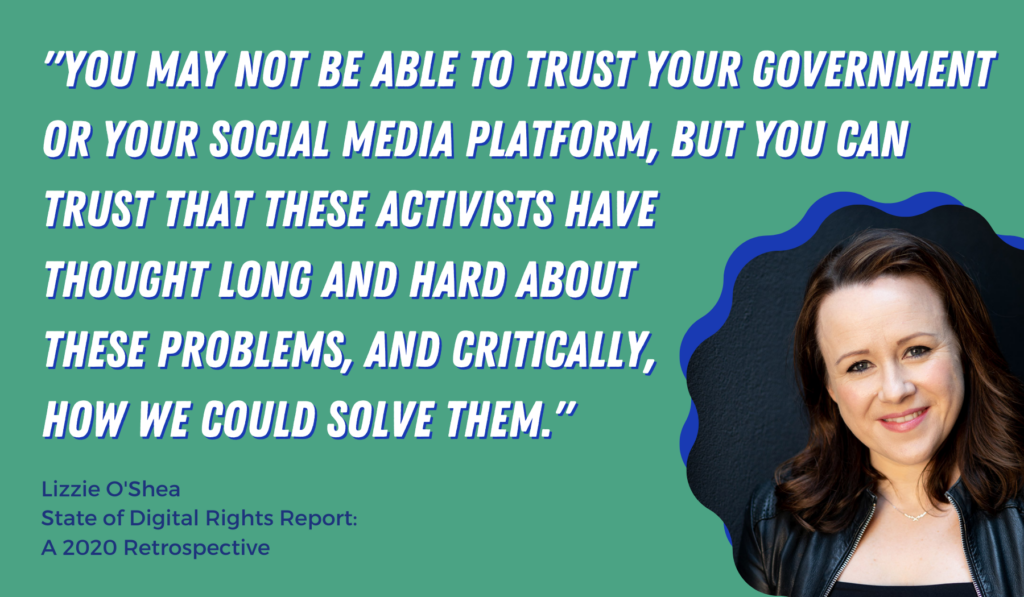We are proud to release the State of Digital Rights Report: A 2020 Retrospective, which examines the many ways Australians’ rights are being impacted by the activities of private companies and governments in the online world.
Over 2020 Digital Rights Watch worked with a number of Australia’s leading activists, writers and critical thinkers to reflect on digital rights in 2020, and make recommendations to pave a way forward. The goal of this report is to support, enhance and promote the conversations we need to be having about digital rights in Australia, and to encourage action through clear policy recommendations.
Foreword from Digital Rights Watch Chair, Lizzie O’Shea

This last year has been unprecedented in more ways than one. Society transformed almost overnight to deal with a global pandemic. It changed how we moved in public spaces, how we socialised, how we learned and worked, and how we understood the role of digital technology. It prompted the government to roll out the CovidSafe app, at great fanfare and expense, only for it to disappear from public discussion months later when it proved to be a dud. CovidSafe was perhaps emblematic of the experience of digital rights advocates in 2020: ignoring privacy and other digital rights comes with consequences.
It is clear that we are more dependent on the web than ever before. Connectivity is not a privilege, it’s essential to our daily lives. This meant that the role of governments and private corporations in our online lives took on a new importance. Governments sought in various ways to use the crisis to expand their surveillance powers, but not without resistance. Companies became central players in moderating the boundaries of public debate, and invariably attracted criticism as a result. In many ways, the pandemic brought into sharp relief digital rights issues that many activists had been working on for years – some of whom have made contributions to this report. You may not be able to trust your government or your social media platform, but you can trust that these activists have thought long and hard about these problems, and critically, how we could solve them.
In some ways, the state of digital rights is more fragile than ever. A crisis is always an opportunity for the powers that be, and they have proven themselves prepared to trample on our rights if necessary. We have seen the expansion of technologies like facial recognition and surveillance drones, without any meaningful public consultation or discussion. Technology at work is increasingly used as a way to keep tabs on workers, a tendency that has accelerated as we transitioned to working from home. But equally, it’s clearer now that power needs to be held accountable in a functional democracy, including in digital settings. Scandals like robodebt – and the powerful, grassroots resistance to it – remind us that governments are prepared to use substandard tech to strip people of their rights and dignity until they are forced to behave differently. So while digital rights might be under attack, there is a growing legion of people who now appreciate their importance more than ever.
The conversations about regulating technology are underway. That includes issues of competition and consumer rights, but also the need to reform privacy laws. For those who value digital rights, now is the time to get them on the agenda.
Read the report
You can download a PDF version of the report here (via dropbox)
Watch the report launch
If you missed our launch on Friday 5th February 2021, you can watch it back here. With approximately 10 activists and writers sharing their reflections on 2020, it’s truly a digital rights power hour!
